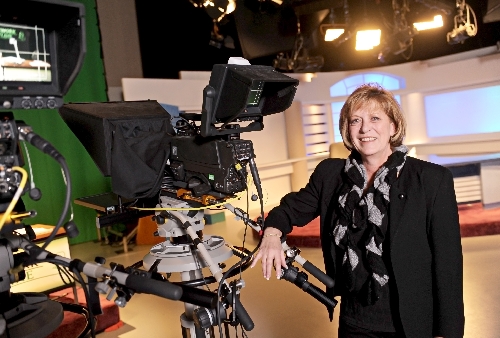Nevadan at Work: Vegas PBS official delights in training workers for future
Education was only supposed to be temporary stop for Debra Solt.
Solt had owned or operated businesses for more than a decade when she happened into a job in 1994 in business and workforce development at a Washington college. She figured she'd help the school write a business plan and move on. But Solt enjoyed the challenges of the field more than she expected, and she realized she could play a role in her children's future if she stayed in higher education.
Solt moved to Las Vegas in 2000 to take a workforce-development job with the College of Southern Nevada. Today, she oversees Vegas PBS' workforce training and economic development initiatives, which offer virtual classrooms in more than 4,000 training topics and 300 certification programs.
Question: Why did you stay in workforce development?
Answer: If you love change and innovation, it's like being a kid in a candy store. You're able to work with business owners and CEOs on what they need in their future workforce, and design programs to meet that need. You get to think outside traditional academia and look at what it's going to take to have a productive and vibrant workforce. The economic climate is changing so fast. Business today has outpaced traditional education in some ways. Education often plays catch-up in technologies that businesses have first, and we don't always teach the ability to adapt and change rapidly. If something changes, how do employees switch gears and finish one task before another? We need people to think critically about how business is done instead of saying, "We've done it like this forever."
Question: We have a lot of unemployed people whose jobs may not come back. They need training. Where do we begin?
Answer: We start with what employers want in a workforce. What are those soft skills? That includes computers. People need to know how to navigate the World Wide Web. They need to know how to complete forms and applications online. They need to be able to get around that keyboard, understand that's how they're going to communicate and check their work. They have to understand that the world of texting and submitting a formal application are two different things. Also, employers are asking for feedback from their workforce. They're asking if there's a better way to do work. There's more of willingness on the part of employers to listen to the workforce. The ability to listen and speak clearly are important soft skills as well. Other soft skills include learning how to work in a multigenerational environment, and how to give a good interview.
Question: Where can people find training for these skills?
Answer: Our community is not at a loss for education programs and services. There are a lot of good consulting groups that have programs. The College of Southern Nevada offers workshops, and we have online programs at Vegas PBS Virtual. The Department of Employment, Training and Rehabilitation has workshops for people to assess their skills, abilities, aptitudes and attitudes. One of my clients, Caesars Foundation, has adopted an elementary school and put together a back-to-work program for parents and other family members who can come to Vegas PBS for online programs in English as a Second Language or getting their GED. I think the problem is, we don't have anything centralized. You have to ask a lot of different people about services, and unfortunately, we don't have money to fund everybody.
Question: How have Vegas PBS' workforce initiatives changed?
Answer: The interesting thing is, they're not what we thought they were going to be. "Anytime, anywhere, any media" is our mantra, and our goal is to add capacity to the workforce. We thought we would have lots of individuals for training. But it's become more of a niche program working directly with businesses or programs. For example, the Southern Nevada Health District needed a new training platform for health cards, and we became the provider for that. We're looking at the launch of a training program with (the Nevada Public Education Foundation's) Ready for Life program to pair mentors with at-risk students to get them through graduation.
Question: How will you boost your original goal of serving individuals?
Answer: Part of it is marketing. We're an invisible resource people don't know a lot about. These are alternative programs they can start today. It offers the convenience of getting education and training without the time constraints of a schedule or a brick-and-mortar classroom. They can work 24-7 from their home computer. Even for the person who's just interested in looking at different sectors, they can take exploratory courses for $115, and look at what a new career might look like, what skills they need and whether online learning is for them. That's the excitement of online learning: You go at your own pace. If it takes one person 25 times to go through a lesson, and someone else goes through it once, there's no judgment.
Question: How can people reduce their odds of having obsolete skills?
Answer: Follow what's going on in the news. As much as some people say newspapers are irrelevant, they're very relevant. Who's moving, or changing jobs, or being promoted? What companies are coming to town? That's the landscape of our community.
The unemployed and businesses need to know who their competition is, what their competition is doing, how they're recruiting and what they're requiring for talent. And companies need transparent career ladders in their organization. You want to train people, and you want them to stay, and that means you have to have opportunities for promotion. Younger workers also need to spend time not just reading the newspaper and watching the news, but they need to ask questions of supervisors and managers and stay abreast of their company's mission. They need to check that mission with their internal values and ask if that's where they want to be. If not, they should ask at what point they start training and putting out their resume. It's easier to find a job when you're employed.
I predict postrecession turnover is going to be critical. We're going to see senior staff leave companies once they feel comfortable with the economy stabilizing and they believe they can quit their jobs and live comfortably. There'll be a lot of positions in leadership. People without degrees who are in jobs now should be working on a degree. Companies like to see that people can complete something, and that they understand how to read financial statements, contribute to a performance evaluation and write well. Management training is available online or at community colleges.
Question: What's the most interesting thing about your job?
Answer: I work with people across industry sectors daily. I might be talking health care in morning, (Occupational Safety and Health Administration) in the afternoon, and later, food handling or diseases. I get a broad look at all disciplines in a way that intrigues me about where our future's going, and the fact that our skills sets or jobs are changing so much.
Question: What's the toughest part?
Answer: There are more inquiries and needs than time allows us to handle successfully.
Question: What is your biggest career accomplishment?
Answer: My job at Vegas PBS. It allows me to put my education career in one place and do it well. Being able to not only launch the Vegas Virtual initiative, but to see it fully, financially self-supporting is exciting. No taxpayer dollars support it.
All the money made in the system is reinvested either in staff or programs and services. To get there in less than three years, I sometimes have to sit back and say, "That's a wow."
Question: What are your future goals?
Answer: To make sure we have vital programs and services to meet not only our workforce needs, but emerging needs of our business, and to make sure programs are fully transparent not only to our community, but to our educators and businesses. I want people to see us as a critical player that adds capacity, and one that lets people explore options before they move into a degree program in our educational system.
Contact reporter Jennifer Robison at
jrobison@reviewjournal.com or 702-380-4512.
Follow @J_Robison1 on Twitter.
VITAL STATISTICS
Name: Debra Solt
Position: Director of Workforce Training and Economic Development, Vegas PBS
Family: Daughters Nicole Ortega, 25, and Jaleesa Ortega, 22; two grandchildren
Age: 53
Quotable: "The economic climate is changing so fast. Business today has outpaced traditional education in some ways."
Education: Bachelor of arts in psychology, Whitworth University; graduate studies, education guidance and counseling, Whitworth University; courses in UNLV's workforce-education program
Work history: Business owner or executive of companies in import/export, landscaping, marketing and training; job developer, business and industry liaison and director of the Business & Industry Center, Lower Columbia College, Longview, Wash.; director, Division of Workforce and Economic Development, College of Southern Nevada; director, Workforce Training and Economic Development, Vegas PBS
Hobbies: Community service through Kiwanis International, reading, travel, gardening
Favorite book: "The Source," James Michener
Favorite movie: "The Wizard of Oz"
Hometown: Seattle
In Las Vegas since: 2000
Vegas PBS is at 3050 E. Flamingo Road and can be reached at 799-1010.




























